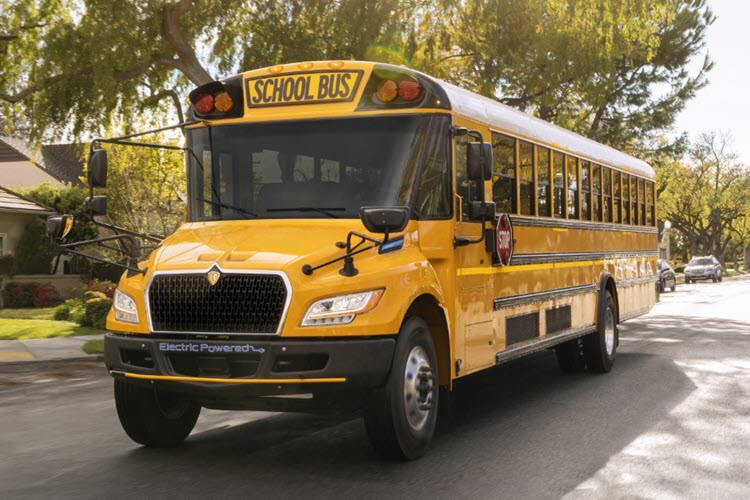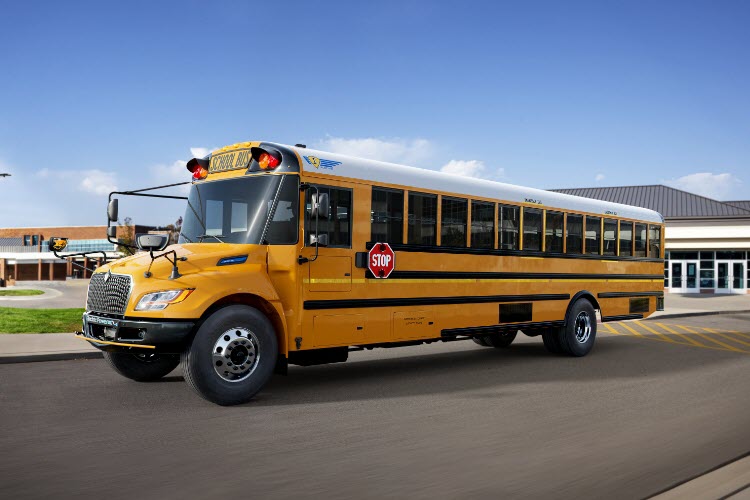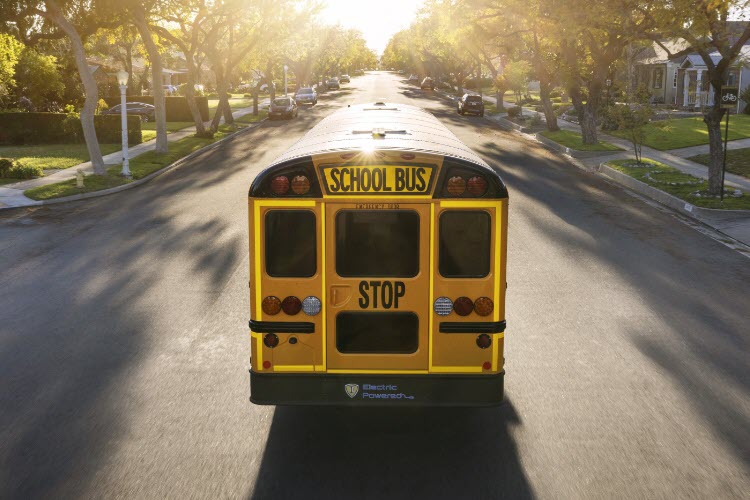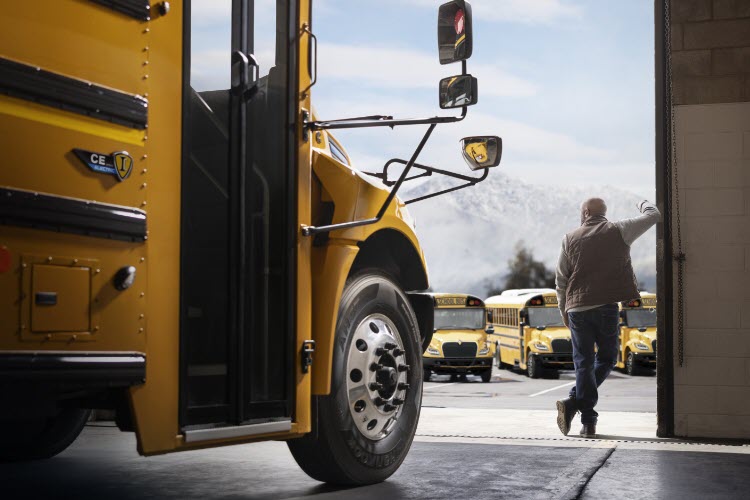School Transportation Director: "Our EV transition has been all about educating."
The move to zero emission vehicles is the biggest change that school transportation has seen in decades. Making the switch requires a combination of planning, research, analysis and education–as well as coordination between multiple stakeholders and suppliers. Elizabeth Fox is Director of Auxiliary Services for Johnson City Central School District in New York. They currently run 35 buses for their student population of 2,700 kids. They have one IC Bus® Electric CE Series bus in service with another three on order.
We sat down with Elizabeth and Frank Continetti, Executive Vice President of Leonard Bus Sales, to discuss what school districts need to know about adding electric school buses to their fleets, and why the Electric CE Series is her vehicle of choice.
What were the primary considerations when adding electric buses to your fleet?
Elizabeth Fox: “First, we wanted to find out if we were eligible for any type of funding, what our capacity was for charging within our current infrastructure, and if we had any routes that could be easily electrified during the pilot stage. Luckily, within our district, the majority of our routes can be electrified, so that was pretty easy.”
How did you address the initial costs associated with purchasing electric buses and installing your charging infrastructure?
Elizabeth Fox: “We installed Level 2 chargers within our existing infrastructure for a minimal cost. We are considered a disadvantaged community by New York state, so we receive funding for bus purchases. We were also able to leverage funding from the New York Truck Voucher Incentive Program and the New York School Bus Incentive Program for our bus purchases.”
What were some logistical or operational challenges you faced during the transition?
Elizabeth Fox: “While planning, we worked with one of our drivers to pinpoint any obstacles so we could find our way through them. He was able to add his insights to help other drivers. One big thing we noticed was drivers have anxiety about how long they can drive the bus. To show them what was possible, we had a driver make their regular morning run and then run it again later in the afternoon with no kids on board. They were able to safely return to the garage even with battery life at just 3%. Since our campus is pretty close to our bus garage, it also helped knowing that they could switch out vehicles in between their high school or elementary route. Having that safety net in place helps drivers get rid of that anxiety and allows them to focus on their job.”
Frank Continetti: “Johnson City CSD did a great job putting together an EV project team, which is one of the first recommendations we make, to manage the process and address any potential logistical problems. Their approach and coordinated effort with our team made the process go well. They did a tremendous job working with the utilities; and as a partner and trusted advisor, we were there to assist when needed.”
How does the IC Bus Electric CE Series fit your needs?
Elizabeth Fox: “After doing research on regenerative braking, we knew we wanted to pick IC Bus. The three levels of regenerative braking has made a big difference in the amount of energy we're able to regain from all the hills within our district. The key has been getting drivers used to aggressive regenerative braking and teaching them how to drive more efficiently. Using telematics, we've been able to collect data about how much energy was put back into the battery through regenerative braking. We were easily able to make it through the day, with the battery not even getting under 40% on some of our routes.”
What kinds of service and support did you get from IC bus and the dealership?
Elizabeth Fox: “Leonard Bus Sales has been really supportive during the entire process. Before we bought our first bus, they provided a demo EV bus so we were able to take all of our administrators on a ride to tell them why we wanted to go electric and the benefits of doing that. They even attended our school board meetings and events when we were rolling out our buses. Leonard’s helped with funding too—gathering information about eligible buses and helping write grant applications. Not only for our New York State funding but for EPA grants as well. Every time there's a new funding opportunity, they send it to me and provide templates to fill in my information. They made the process pretty easy and have been there every step of the way. They also offered to have outside grant writers come in and help cover the cost of that.”
Frank Continetti: “Our team at Leonard Bus Sales worked closely with the EV team at Johnson City Central School district to assist them during the entire process of adding new electric CE Series buses to their fleet. Our EV experts helped the district with needs assessment, grant funding, site planning and vehicle readiness. Our one-stop-shop approach included everything from helping assess utility capacity and route planning, to preparing grant applications, charger recommendations and providing training for technicians and drivers. We believe part of our responsibility is to assist our school transportation partners with applying for various state and federal funding programs as they transition to electric school buses. We worked closely with the Johnson City Central School District to prepare and submit their applications for state and federal grant funding which ultimately helped offset the increased costs of electrification.”
How does IC Bus and the Zero Emissions Team help customers find funding opportunities and navigate the application process?
Frank Continetti: “IC Bus does an excellent job helping our customers identify funding opportunities by providing access to software that allows the district to search for grants and incentives by zip code. IC Bus also partnered with a grant writing company to assist districts in the grant writing process. Both resources are a great complement to the service and support we provide our school transportation partners as they embark on their electrification journey.”
What has been the reaction by schools, parents, drivers and students to the Electric CE Series?
Elizabeth Fox: “The kids think they’re pretty cool. They always mention how they are quieter than diesels and have a smoother ride. They also really like that the electric buses are better for the environment. Parents are happy that the kids are not breathing diesel fumes.”
How did you manage the training for drivers and maintenance staff on the new electric bus technology?
Elizabeth Fox: “Making the message clear about where we stand on wanting to transition to EV has really been significant. It's no longer a debate, we’re committed to doing it. We have trained several of our current drivers and have trainers for new incoming drivers. Our maintenance staff has been attending seminars. Leonard Bus Sales came in and we did a first responder training. We had over 100 attendees and it was really well received. Telematics helps us see alerts on charging or if there is anything wrong with the vehicles. Having that data readily available is great and has helped with our routing and our dispatching.”
What techniques have you found that help teach drivers how to maximize their use of regenerative braking?
Elizabeth Fox: “The key is to have a driver who is really an expert take another driver out and spend a couple hours with them doing the pre-trip. Show them what is different, teach them how to drive it on Level 3 and explain what we expect out of them.”
What steps does Leonard Bus Sales take to assist districts in training their staff and drivers on the new electric bus technology?
Frank Continetti: “Just like everything else, when it comes to training, Leonard Bus Sales is a partner in the process. We have trainers on staff and we have developed training programs for both technicians and drivers. The programs include videos, written materials and hands-on training. The training typically takes place around the time the district receives their school buses.”
What role did community engagement and stakeholder buy-in play in the success of your transition?
Elizabeth Fox: “Our EV transition has been all about educating—our transportation staff, school staff, school board, community and even our students. The more you can educate your own community, the more they can go out into the public and be advocates as well. The student engagement has been really important. We've given our presentation to high school students, had them demo the bus and fill out a survey about what they thought about it. The district feels really strongly about using this as an instructional tool for kids. They're the ones that are growing up with this big EV transition. There's going to be a ton of jobs opening up, so if they're not exposed to this technology and opportunities that could be available, they might miss out on that. We have a local gigafactory that makes batteries and we were able to do a field trip there to give the students a hands-on look at how the batteries powering EV vehicles are made.”
What motivates you personally to advocate for the transition to electric buses in your district?
Elizabeth Fox: “I just think it's a better ride for kids. The quietness is a huge benefit, it brings the behavior level down, the stress level down. We begin and end their day, so anything we can do to make the ride better is what we should be doing as adults. It's better for drivers, too. Many school districts are having driver shortages, and electric buses can help. For drivers, it's definitely less stressful and helps eliminate distractions. When the bus stops the vehicle is almost silent, so it's just the noise of the students talking. That helps them focus while they're loading and unloading. I've driven the electric bus on route many times, too. Every time I drive, I try to grab the electric bus. It's just an amazing difference.”
Frank Continetti: “The team at Leonard Bus Sales is passionate about the safe transportation of school children and this core value permeates everything we do, including helping our school transportation partners transition their fleets to electric.”
How do you envision the future of school transportation with the widespread adoption of electric buses?
Elizabeth Fox: “Here in New York, they're mandating 100% electrification by 2035. To help other local districts get ready, we’ve hosted electric bus learning days to show them what we've been doing, share our learnings and take them for a ride on the bus. I really think getting people on the bus makes a big difference. Just being able to see it in action and hear how quiet it is, you can't even tell it's turned on. One of our neighboring districts put through a proposition to voters and it passed. They've now purchased their first EV bus and that was partly the result of them coming over with their facilities director. We had a follow up to demo it with their drivers and meet with their superintendent, so I think that helped create the energy for them to add an electric bus.”
How can other districts benefit from local, state and federal funding to help make the transition to electric?
Elizabeth Fox: “We were able to purchase our electric buses cheaper than our diesel buses with the funding that was available to us. If you can buy an electric bus for cheaper than you can buy a diesel bus, it doesn't make sense not to. The key is to stay up to date with what funding is available and the application deadlines. You should also reach out to your dealer for help getting your applications done. The other part is funding the electrical infrastructure. Our district is working on an upgrade to our electrical infrastructure. We've applied for funding and are just waiting for approval.”
What advice would you give to a school district that wants to electrify but might not have the same financing opportunities?
Elizabeth Fox: “I have heard of people coming up with some pretty creative solutions. Some districts have used regional cooperative programs to write grants together instead of for just one district. Another approach I've seen is a district purchasing an older bus that met mileage requirements and then putting it into their fleet to later become eligible for electric bus funding.”
How do state mandates impact your dealership?
Frank Continetti: “New York’s electric school bus mandate, which takes effect in 2027, motivated us to act quickly to make significant investments in our facilities so we could be ready to assist our school transportation partners. We had to make facility upgrades, install infrastructure and chargers, develop and implement safety measures and plans, designate service bays and parking lot space for EVs, purchase safety equipment, train technicians in each facility and educate our entire team about New York’s electrification law.”
What advice would you give to other eBus dealers and school districts considering transitioning to an electric bus fleet?
Frank Continetti: “Given that there is a state mandate in New York State which calls for all buses purchased to be electric beginning in 2027, we are recommending school districts begin their planning process now and consider purchasing at least one electric school bus as soon as possible. Districts need to start the process and engage their utility companies early. It’s a lengthy process, usually taking somewhere between 18-24 months. There’s a lot of planning required to transition a fleet, so put together an EV project team, utilize the resources provided by your school bus dealership and educate yourself. We don’t recommend trying to transition your entire fleet all at once – there’s a learning curve and moderation is a good policy.”








